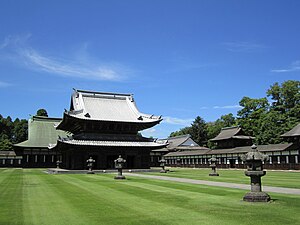
Takaoka (高岡) is a port city in Toyama, Japan. While the prefecture's second-largest city, the main reason for travellers to visit is the ferry to and from Vladivostok, Russia.
Understand
[edit]Tourist information site
[edit]The local tourist association has a multilingual guide site[dead link].
Get in
[edit]By train
[edit]Takaoka has two main train stations. 1 Takaoka Station, in the center of town, is operated by the private Ainokaze Toyama Railway, with IR Ishikawa Railway trains offering one-seat service from Kanazawa. 2 Shin-Takaoka Station to the south serves the Hokuriku Shinkansen. The two stations are connected with a 3-minute trip on the JR Jōhana Line (¥140).
Hourly Hakutaka Shinkansen services from Tokyo stop at Shin-Takaoka, taking 2 hours 45 minutes (¥13,380; free with the Japan Rail Pass). With a good connection, you could also take the faster mornings-and-evenings Kagayaki to Toyama, and then transfer to the Hakutaka or Tsurugi, potentially saving 15 minutes.
From the Kansai cities of Kyoto and Osaka, take the Thunderbird limited express to Kanazawa (¥7,450), then:
- For Takaoka Station, transfer to the IR Ishikawa Railway (40 minutes, ¥820) for a total time of about 3½ hours from Osaka. This part of the trip is not covered by the Japan Rail Pass.
- For Shin-Takaoka Station, transfer to the Shinkansen Hakutaka or Tsurugi service for a 15-minute trip (total fare ¥8,910 from Osaka), taking 3 hours from Osaka. This is fully covered by the Japan Rail Pass, but if you wish to continue to Takaoka Station the wait times for the train can vary — a bus, a taxi or a walk may be faster depending on the time of day.
By ferry
[edit]3 Fushiki-Toyama Port (伏木富山港 Fushiki-Toyama-kō) is located a fair distance from central Takaoka. Depending on where you dock, it's a 10- to 20-minute walk to JR Fushiki Station, three stops away from Takaoka on the JR Himi Line (氷見線), or a 5- to 10-minute walk to any of several stops on the tram line. If you're entering Japan this way, you cannot exchange your Japan Rail Pass in Takaoka; the nearest station that accepts them is Kanazawa, over 100 km away (¥1,030 by IR Ishikawa Railway, ¥3,000 by JR).
Get around
[edit]The Man'yōsen tram line (万葉線) trundles through town, starting at JR Takaoka Station. (Note that maps and route searches consider the Manyosen station as a separate one labeled Takaokaeki, which is as awkward in Japanese as it is in English: "'Takaoka Station' station".) Fares are ¥200-400 depending on the distance. It runs every 15 minutes from 05:30-23:30.
The JR Jōhana Line runs south into the suburbs of Tonami and Nanto, and the JR Himi Line runs north and then east along the coast to Himi.
See
[edit]
There are a few sights of mild interest in Takaoka.
- 1 Takaoka Great Buddha Statue (高岡大仏 Takaoka Daibutsu) (near tram Sakashita-machi (坂下町) stn). Claims to be one of Japan's Top 3 Buddhas, although it's actually only in the top three if the height of the halo is included.
- 2 Zuiryū-ji Temple (瑞龍寺) (10 min from JR Takaoka south exit). Daily 09:00-16:30. A large Soto Zen temple, three of whose buildings have been designated as National Treasures. ¥500.
Do
[edit]Buy
[edit]Eat
[edit]- Shin Minato Fisherman's Wharf (新湊きっときと市場) (near Higashi-Shimminato Station). 9AM-5PM daily.
Drink
[edit]Sleep
[edit]Connect
[edit]Go next
[edit]- Gokayama — World Heritage village famous for its gassho-zukuri houses
- Tonami
- Himi
- Imizu
- Oyabe
- Nanto
- Toyama
- Tsubata
- Kanazawa — perhaps the best-preserved major Edo-period city in the country
| Routes through Takaoka |
| Joetsu ← Toyama ← | N |
→ Oyabe → Kanazawa |


